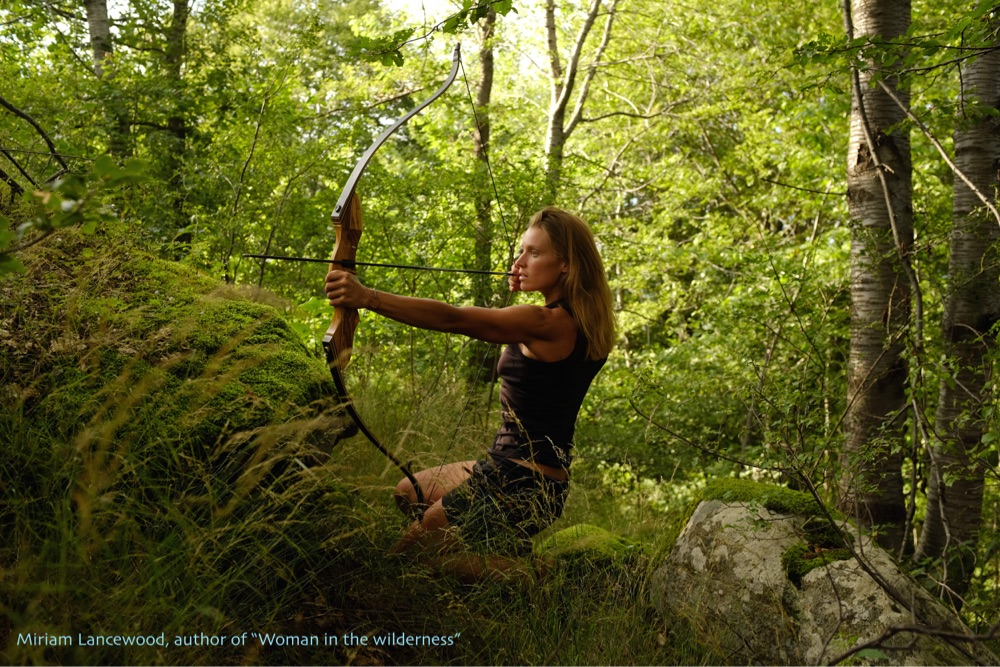Interview with Miriam Lancewood
Woman in the Wilderness for The Sustainabilist
The Dutch born Miriam Lancewood and her husband Peter Raine discarded all belongings and decided to live in the wilderness of New Zealand. With minimal food supplies, a pack, tent, and a bow and arrow they set off into the the Southern Alps. They cooked on a fire, slept in their small tent and moved around like nomads. For seven years, they lived the way our ancestors did, surviving by hunting wild animals and gathering plants.
“In Europe and Asia we witnessed the effect of over-population. We smelled burning plastic, walked in smog, saw mountains of plastic and polluted rivers.
So, to arrive for the first time in the South Island of New Zealand was a relief. With its geographical position and low population, I saw a relatively pristine, untouched environment. In the mountains we could breath the purest air and drink out of any stream.
I worked as a physical education teacher in town, and every weekend we used to go hiking. During one of those trips, we realized we had no desire to go back home. We didn’t need a house, a car and possessions, and didn’t want to work in order fund all that.
We wanted to find out what would happen to the body and mind when living far away from society, away from noise, busyness and machines. What would it be like to live without time? To sleep when it is dark, to eat when we are hungry? To hunt to survive? To live in stunning wild beauty?
We wanted to move away from the consumer-orientated society, to live closer to the earth. We wanted to re-connect with nature and be part of nature, rather than just an observer.
So, we set out in the autumn of 2010. The first day was marvelous. We enjoyed the rocks and cliffs, high mountains and the cool air. But soon we were struck with a sense of boredom and restlessness. We had been so busy with work, socializing, computers and social media, and we had to slow right down. It took two weeks to meet the slower rhythm of nature, after which we felt at ease and peaceful. I could sit for hours and watch the river flow. We slept long nights in the winter. Our bodies recovered, repaired, and rejuvenated by living with the natural rhythms. Naturally, we looked after our direct environment, the place that we called home.
We explored and discovered places no humans had ever seen. We climbed mountains, hiked up rivers, and I learned to hunt. Our bodies became flexible and strong. We never fell sick, never had injuries and were as healthy as all the animals we ate. Slowly, my senses improved, I needed my ears and eyes to find wild animals. Over the years, my intuition developed. I could sense rain coming, where a mob of goats might be, and which plants had some medicinal values. Memories faded, inner conflict dissolved. The wilderness became our home and our mind became clear.
We live with the rhythm of the sun and the moon. We sleep when it is dark and wake up at dawn. I feel happy and healthy. When I am in the city however, I get sleep deprived with the electric lights. After a week, I feel like a different person; I am more tired and emotional, on the edge of being sick and I eat the wrong food.
An exhausted mind is not always capable of doing the right thing. To get clarity and make sustainable choices in our personal life and the planet in general, I’d say, start with sleeping. Switch off the lights, and rest. Do this for three months and see what happens.”
Miriam Lancewood is speaking about her experience at Emirates Airline Festival of Literature, Saturday 08 February, 10:00 – 11:00 in the session Woman in the Wilderness.
She is also part of the panel discussion Dispatches from the Wilderness: Ali Al Saloom, Gavin Thurston, Kate Humble & Miriam Lancewood
Thursday 06 February, 19:00 – 20:00
Dispatches from the Wilderness: Ali Al Saloom, Gavin Thurston, Kate Humble & Miriam Lancewood
Look on the website miriamlancewood.com for more information.




